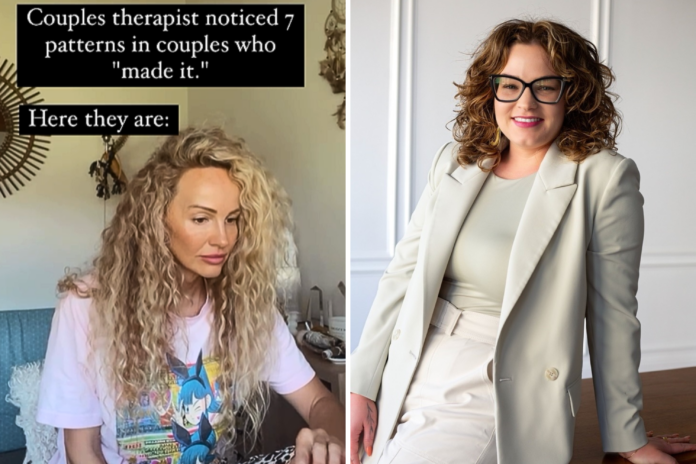When it comes to relationships that can weather even the most severe of storms, these couples often have in common a number of behavior and communication patterns.
Thanks to a comprehensive social media post by Aneta Siedlecka, a Polish-born holistic transformational coach based in Australia, viewers can learn about relationship must-dos and, of course, what to avoid.
Siedlecka (@integrated_wellbeing_) shared a video on Instagram, along with an audio clip that she had not recorded that detailed seven patterns that a couples therapist found in couples who had “made it.”
Since it was shared to the platform on March 11, Siedlecka’s post has been viewed more than 2.3 million times.
Here are the seven key principles that those pursuing a lasting relationship should take note of:
The Seven Patterns in Couples Who Made It:
- They had “boundaries with family” members.
- They always put their relationship first and “did what was best fo each other.”
- They were “best friends” and enjoyed spending time together.
- They had been through “dark times” but chose to stay together and work through their differences, which can establish trust.
- They let each person “be themselves” and respected each other for being that way.
- They “communicated regularly” and did not shy away from difficult conversations.
- They did fight, but “emotional regulation was always present” and they always bounced back from the conflict.
The advice on Siedlecka’s post can be traced back to Nicole LePera, a holistic psychologist who was trained in clinical psychology at Cornell University and the New School for Social Research.
Before developing her interest in holistic psychology, LePera worked as a clinical psychologist in private practice. She has a large following on X (formerly Twitter), where she regularly offers advice or summarizes her personal experiences. Her seven tips can be found there too.
“I can’t take full credit for the popularity of the reel,” Siedlecka told Newsweek. “Though I created and starred in it, the voice-over wasn’t my own. But as a holistic transformational coach, I’m passionate about sharing content on social media that resonates with both my clients and the essence of my work.”
@integrated_wellbeing_
She continued: “For me, social platforms serve as a means to support and connect with like-minded individuals while imparting wisdom and love from fellow creators. Knowing that this particular reel has touched so many hearts fills me with gratitude beyond words.
“Ultimately, my aim is to aid others, and I’m humbled by the positive reception this video has garnered,” she said.
‘They Have Constructive Conflict’
Newsweek reached out to a couple’s therapist and a licensed counselor with particular expertise in trauma for their takes on these viral nuggets of wisdom and whether we should be following them.
“The couples who stay together do have constructive conflict,” Stephanie Manes, a psychotherapist, told Newsweek.
“That means that when something doesn’t go well between them, they can come back together after the disagreement and look at what happened,” she continued. “They offer apologies for anything they did or said that hurt their partner, and their partner accepts the apology graciously. When they are not on the same page about something, they are willing to actively work to find solutions that allow both parties to get some of what they want or need.
“But, I would add, the most important ingredient in any healthy relationship is the capacity for self-reflection. Each partner recognizes that they are not perfect and that relationship patterns aren’t about cause and effect. To be a good partner, we need to be open to seeing where our own growth edge is,” said Manes, who also teaches couples therapy at Columbia University.
She went on to say that a sense of humor goes a long way too. This echoes the sentiment of LePera’s fourth tip: that the couples who “make it” can be confronted with dark times and yet still lift each other up.
“When partners can laugh at the other’s shortcomings and their own, things feel less do- or-die all the time. Humor breeds emotional generosity, and who doesn’t need that?” Manes said.
Kayla Meyer is a licensed counselor and the co-founder of Pothos Health, a clinic providing therapeutic services in Texas and Florida. Her specialism area is in trauma.
“The couples who want to make the relationship work possess a desire to be together, not a necessity or need but a true desire,” Meyer told Newsweek.
“Often couples find themselves in a codependent relationship where one or both partners have convinced themselves they can not survive without the other due to finances, emotional labor or family dynamics,” she said. “But the reality is, we are all able to be securely attached to our partner, and that leaves room for desire.”
Meyer continued: “Great couples also let conflict exist outside of their daily communication. Couples can find themselves in what I call pending conflict or future decisions that cannot be solved right now but they are not agreeing on the decision.
“When these pending conflicts or past hurts are discussed, the couple can enjoy the day-to-day building of memories while knowing they are not being ignored because the conversation is evolving in its own space,” she said.
Have you noticed any red flags that made you end a relationship? Let us know via [email protected]. We can ask experts for advice, and your story could be featured in Newsweek.
Uncommon Knowledge
Newsweek is committed to challenging conventional wisdom and finding connections in the search for common ground.
Newsweek is committed to challenging conventional wisdom and finding connections in the search for common ground.


